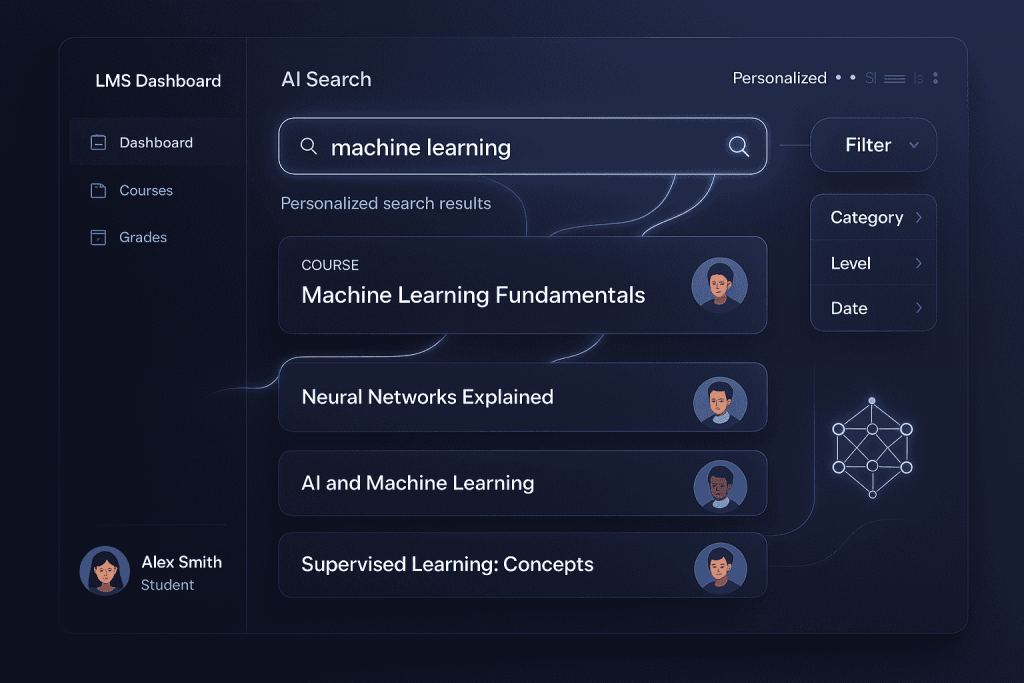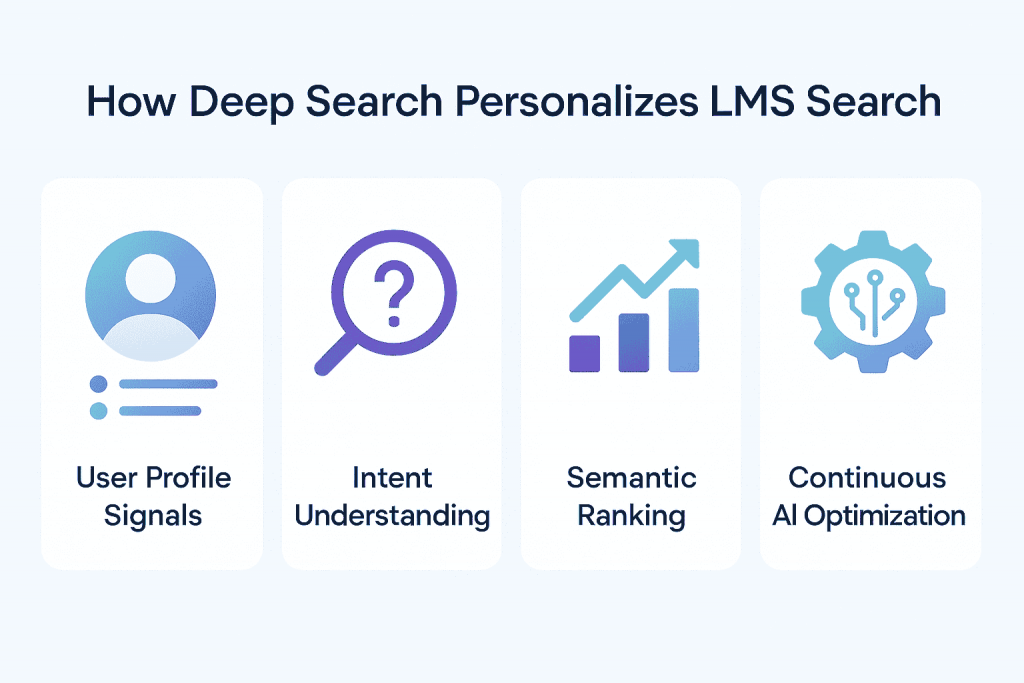In modern learning environments, one of the biggest challenges is helping users find the right information quickly. LMS platforms hold hundreds, even thousands, of courses, PDFs, videos, SOPs, and micro-resources. Yet most learners spend more time searching for content than actually consuming it.
This is where Personalized Search becomes a critical feature. Instead of offering generic search results based on keyword matching, AI-driven systems like Deep Search tailor the results to each user’s background, behavior, and context.
Personalized search is not the same as personalized learning. It doesn’t adjust the learning path. It doesn’t modify the curriculum. It simply ensures that the search results displayed are the most relevant ones for that individual, based on their profile and current needs.
This blog explores how personalized search works in an LMS, how Deep Search improves accuracy and relevance, and why organizations need it to create smarter, scalable learning ecosystems.
Why Personalized Search Matters More Than Ever in LMS Platforms
Most traditional LMS platforms still use basic keyword-based search. While functional, it misses key signals such as job role, skill level, usage history, and real query intent. That means learners must sift through long lists of loosely related results, wasting time and lowering platform engagement.
Most learning systems return results based only on keywords. But as organizations shift toward modular learning and on-the-job embedded learning, knowledge is spread across courses, videos, PDFs, microlearning modules, and real-time resources.
Personalized search solves this by ranking results based on the person, not just the text.
Instead of “show everything with the keyword,” it follows a smarter approach:
“Show what this specific user is most likely looking for.”
This shift transforms search from a static look-up tool into a dynamic, user-aware system that helps learners get to the right content instantly.
How Personalized Search Engines Work Inside an LMS

Personalized search in an AI-powered LMS relies on several behind-the-scenes processes that make results smarter, faster, and more relevant.
1. Collecting Relevant User Signals
To personalize search results, the LMS gathers structured and unstructured data about the user. This may include:
- Job titles or departments
- Topics previously searched
- Content viewed or interacted with
- Skills they are associated with
- Courses completed
- Preferred content formats (video, PDF, module, quick reads)
This allows the LMS platform to build rich user models that help predict what learners truly need. These data points help the system understand the user’s context and predict what results will be most useful.
The goal is not to personalize learning itself, but to personalize how search retrieves and displays information.
2. Generating a Dynamic User Profile
AI algorithms convert raw user activity into a dynamic profile. This is not a static “tag” or “role-based” map. Instead, the system continuously updates the learner’s model based on:
- Search behavior patterns
- Frequently visited topics
- Time spent on content
- Engagement with specific categories
- Skill associations inferred from content usage
This ongoing adaptation allows the search engine to refine relevance over time. Even if two employees search for the same keyword, their profiles determine which results rise to the top.
3. Interpreting the True Intent Behind Search Queries
Unlike traditional search that relies on exact keywords, personalized search tries to understand what the user actually means. It considers:
- Query context
- Synonyms, variations, and related terminology
- Industry-specific language
- Ambiguous or vague search inputs
- Past patterns for similar queries
For example, if one user searches “customer handling,” the engine may prioritize soft skills videos. Another user with a technical support profile may receive escalation process documents instead.
This is especially powerful in large enterprises using AI-powered corporate LMS environments where job roles vary widely. Intent understanding ensures the search becomes intuitive, similar to modern consumer-style search engines.
4. Ranking and Re-Ranking Results Based on Relevance
Once the search engine gathers all potential matches, AI-based ranking algorithms step in. These algorithms reorder results based on:
- User profile
- Click-through probability
- Behavioral patterns
- Previous interactions with similar content
- Content freshness and quality
- Organization-level priorities (if configured)
This ensures that results at the top of the list are the ones the user is most likely to need, not generic matches based on keyword count.
Benefits of Personalized Search for LMS Users
Personalized search improves search experience efficiency across all levels of the organization. Here are the core benefits, strictly focused on search, not learning paths.
1. Faster Discovery of Relevant Content
Users instantly access the materials they need without filtering through irrelevant items. This reduces friction, saves time, and helps employees navigate large content libraries easily.
Personalized search drastically shortens the time spent finding information, especially in large organizations with dense content repositories.
2. Higher Search Accuracy and Relevance
Because search results adapt to who the user is and what they typically need, accuracy increases with every interaction. The system becomes smarter and more relevant over time.
This builds trust in the LMS search function, encouraging users to rely on it daily.
3. Reduced Cognitive Load for Users
When results feel tailored and organized, learners do not experience choice overload. They don’t need to scroll, refine, or rethink their search. The system does the heavy lifting.
This improves platform usability and keeps users engaged with the LMS.
4. Support for Self-Directed Search Behavior
Many employees prefer searching for short answers or quick references rather than following full courses. Personalized search supports this behavior by making the search experience predictably accurate.
It ensures users can find targeted information at their own pace, but without drifting into personalized learning territory.
Benefits for LMS Administrators and L&D Teams
Personalized search also improves the backend efficiency of learning managers and administrators.
1. Better Insight into Search Trends and Gaps
By analyzing personalized search logs, administrators can identify:
- What employees are searching for
- Which terms produce low-quality results
- Trends in content demand
- Topics needing new or updated resources
This provides data-driven direction for content planning and optimization.
2. Higher Efficiency Through Automation
Traditional tagging and organizing can be manual and time-consuming. Personalized search reduces reliance on manual curation by intelligently ranking results based on behavior and context.
This frees L&D teams from micro-managing the LMS content structure.
3. Improved Engagement Metrics and Platform Usage
When search works well, users return to the LMS more frequently. They rely on search to navigate content, which naturally increases overall platform engagement and completion reporting.
Accurate search enhances the usability of the entire LMS ecosystem.
4. Scalable Search Personalization for Growing Teams
Personalized search adapts automatically as new users join, roles change, or content expands. This ensures large organizations can scale learning without overwhelming administrators.
Deep Search handles personalization at a scale that manual systems cannot match.
How Deep Search Enhances Personalized Search in LMS

Deep Search goes beyond typical LMS search features. It uses AI, semantic understanding, metadata extraction, and multi-layered analysis to deliver highly relevant, context-aware results, even for complex or incomplete queries.
1. Semantic Understanding of Queries
Deep Search doesn’t just look for exact keyword matches. It studies:
- Meaning
- Intent
- Context
- Related concepts
- Industry language patterns
For example, “sales objection techniques” might also surface “customer negotiation tactics,” “client communication skills,” and related resources.
This gives users access to a richer, more intuitive search experience.
2. Retrieval from Both Visible and Hidden Content
Deep Search analyzes:
- Course descriptions
- Lesson transcripts
- PDF content
- Slide text
- SCORM metadata
- Assessments
- Internal knowledge documents
This ensures no relevant content remains buried within the LMS.
Users discover information that even they didn’t know existed.
3. Handling Multi-Part or Complex Queries
Technical and operational teams often search using long or detailed queries. Deep Search can parse and interpret multi-layer questions such as:
“compliance rules for remote onboarding in finance”
It breaks the query into components, understands the relationships, and surfaces precise answers, something basic LMS search cannot do.
4. Elevating Niche, Specialized, or Rare Content
Deep Search identifies and highlights highly specific content that might otherwise appear far down the results list. This is especially valuable in:
- Finance
- Healthcare
- Retail and Hospitality
- Manufacturing
- IT and SaaS
Users get access to exact information without wading through unrelated material.
5. Continuous Algorithm Improvement
Every search interaction teaches Deep Search something new. The model continuously refines:
- Relevance scoring
- Ranking weights
- Intent prediction
- Content-topic mapping
- User preference patterns
This leads to an ever-improving search experience for the entire organization.
Personalized Search Is the Future of LMS Navigation
Personalized search is becoming the backbone of modern enterprise learning. For companies adopting AI-powered LMS platforms, Deep Search is not just a feature, it’s a competitive advantage.
As organizations build large digital learning ecosystems, search becomes the central interface for accessing information. Generic keyword search no longer works in environments where users expect speed, relevance, and accuracy.
Personalized search, powered by intelligent user modeling and AI, ensures every learner sees results tailored to their context. Deep Search takes this even further by incorporating semantics, contextual analysis, and advanced content retrieval.
This is not personalized learning. It is personalized search, a targeted, efficient way to ensure learners find exactly what they need, the moment they need it.
